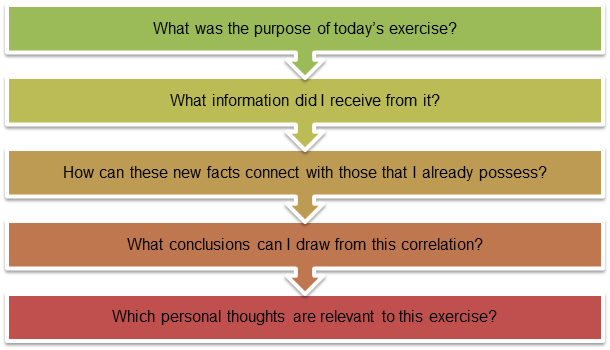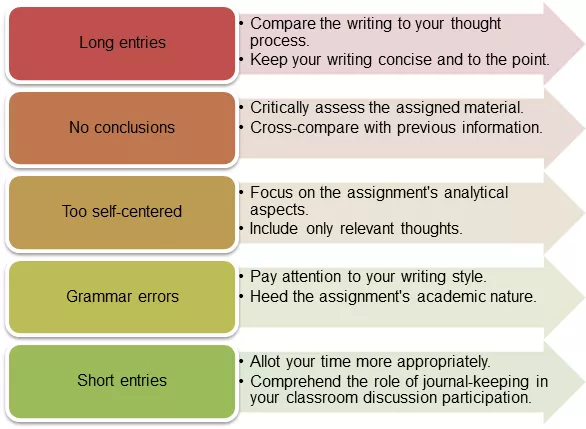Journal
This piece of content has been developed by IvyPanda's editorial team.
No AI was involved in the creation process; only qualified experts contributed.
The information, facts, and sources presented in the text have been carefully checked and verified.
You are free to use it with proper referencing.
An intellectual journal is a reflective assignment that is intended to encourage students to take a thoughtful approach toward their topic of study. Despite the seemingly easy nature of journal writing, many students will attempt to avoid it altogether, considering it a useless task. Meanwhile, those who engage in journal writing may make common, easily avoidable mistakes. Thus, this type of exercise either becomes rare in an academic setting or is poorly executed, even though the intention of such an assignment is to both promote self-discipline and create a habit of intellectual endeavor.
How to Start a Reflective Journal
Before starting an assignment, it is crucial to comprehend its nature and goals, elements that students may fail to grasp. Due to its informal nature, most students see a journal as a task easily performed at the last minute, treating it like a time log and a mere accessory of their learning process. This approach misses the objective of journal writing, reducing it to a timekeeping device; however, the end goal is to encourage students to critically assess their acquired knowledge. In writing down your thoughts and choosing appropriate words, you create a structure that transcends the thinking process. Thus, not only do you immerse yourself in learning by engaging in this method, but you will also cultivate the necessary determination that should accompany you throughout your academic career.
Use Appropriate Structure
Despite its reflective nature, journal paper writing has its own rules, requiring a specific approach that varies only slightly from that for a more formal academic writing assignment. It is necessary to adhere to the assignment guidelines; this is not a personal diary. Thus, establishing personal guidelines within a structure that is, by definition, somewhat lax will make it possible for you to create a system of support for this writing task.
Create Outline Questions
As in any assignment, first identify your primary goal, whether the purpose is to write a research paper or analyze a reading section, and outline its objective. Every assignment, in general, tends to be built around essential queries, and in this case, you should ask yourself a minimum of five questions (see fig. 1). Providing the answers can bring you closer to writing a thought-provoking journal entry that may contribute to stimulating classroom discussion while at the same time helping you perfect your thinking skills. Do not be afraid to selectively include personal thoughts, since cultivating the ability to form an opinion is a direct purpose of this type of exercise. Keep in mind that this list is only a starting point for you as a first-time journal writer. In other words, you should expand on it by writing your own guiding questions that are relevant to your assignment.

Use the Date as a Separator between Entries
After you have created a basic outline for yourself using self-generated guiding questions, you may begin writing in your journal. Preface each entry with a date, a practice that will permit you to keep track of your progress and thought process, allowing you to observe your academic growth through your work. A cluttered and unstructured journal is unlikely to develop understanding of the material’s progression, consequently resulting in low marks.
Choose a Fitting Tone
This type of journal is an academic assignment, not a personal choice, and you must treat it appropriately and avoid using informal language. The chosen tone may be conversational, yet you should eschew excessive colloquialisms and slang unless they are imperative to the assignment. An ideal way of going about writing journal entries is to compare writing to thinking aloud, not obsessing over the end material being academically perfect. Keep in mind, however, that the product of your writing should be coherent and should not appear as a collection of disjointed thoughts. Additionally, the journal genre permits writing from the first-person point of view, which means your professor will not penalize you for saying “I” in a task that is deeply rooted in assessing your thoughts. Keep a careful balance between formal and informal language, and do not forget that an academic journal is a direct reflection of your scholarly process.
Avoid Common Mistakes
Even after following all the appropriate steps, many students may still make certain mistakes, demonstrating a shallow understanding of the goal of a journal entry. Such mistakes include, but are not limited to:
- purposefully long journal entries whose only aim is to create length;
- summarizing the assigned material with no analysis or conclusions drawn;
- excessive reporting of personal feelings, unrelated to the core assignment;
- lack of grammatical or lexical structure;
- last-minute, overly brief, and rushed entries.
All these mistakes are likely exert a negative effect on students’ marks, but they are also easily avoidable and correctable. To resolve them, it is only necessary to return to the core definition of a journal entry as an educational, self-reflective assignment (see fig. 2). Avoiding or correcting the highlighted issues will not only help you hand in high-quality journal entries but will also improve the overall quality of your academic writing.

Summary
Writing a journal helps you, as a student, make connections between seemingly unrelated material, contributing to your progress in your scholarly ventures. Therefore, carrying out the assigned journal-writing task while understanding its self-reflective nature is a significant aspect of not only learning but also discipline, a critical character-forming trait. A journal, balancing between formal and informal writing, serves as a demonstration of your understanding of a topic and its correlation with previous material and a display of your knowledge in terms of your overall learning goals.